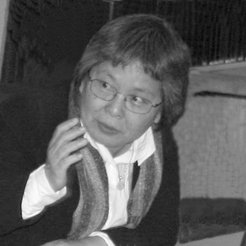Interview with Wong Ing Boh Diana
(University of Malaya)

Diana Wong is Associate Fellow, MCRC, ath the University of Malaya. She has previously worked in Germany, Singapore and Malaysia.
For further information click here.
What does ‘diversity’ mean to you by way of your work and field of expertise?
I think I would begin by saying that what diversity means to me by my work is actually by way of my life. I am living in an everyday structure of diversity, not just religious, but also ethnic and so diversity is an everyday experience. And that is reflected in the way I work about diversity and the kind of expertise that I have acquired about diversity. That became clear to me when I came to live in Germany. It is such a it WAS a homogenous society. Diversity was not an issue, and it was not just not an issue, it wasn't a part of the structure of sentiment, of the habitus, of German academics as well. So I think that's what I would say generally to the question of diversity in my work.
Are you originally from Malaysia?
Yes, I was born in Malaysia grew up in Singapore. At that time Singapore was part of Malaysia. –
Is ‘diversity’ just a Zeitgeist term – a post-multiculturalism policy catch phrase - as in ‘integration and diversity’ policy - a corporate tool - as in ‘diversity management’ - or can it be a concept that can help structure and advance social scientific analysis?
My main concern with a generic and comprehensive use of diversity as a social science category is that diversity is very much a projective term. It was used by civil society as a political concept in the context of a politics of recognition. Vielfalt – alle sind gleich. And everything should be included. The problem with it for social scientific analysis is that in this concept of Vielfalt or diversity in the politics of recognition, there is a blindness or there could be a blindness to the politics of power which structures relations between differences. And that is my main problem with the concept of diversity as an overarching concept, as a social science concept.
I see your point. - At MPI-MMG, we are looking to develop research and theory spanning contemporary immigration societies, especially in Europe, and longstanding multi-ethnic and multi-religious societies, such as South Africa, India and Malaysia). How do you see the concept of ‘diversity’ shaping this agenda – or not?
Yeah, I think this distinction between contemporary immigration societies and long-standing multi-ethnic and multi-religious societies is an important one as two different forms of structures of diversity. Again I am not sure that “diversity” as a term in itself would be particularly productive. I think there is a danger, with an excessive use of that term to become… There is a danger in research on diversity for diversity itself to be seen as a surface phenomenon. Political diversity is like that… Social cultural diversity is like that… Religious diversity is like that… I think a research agenda would have to look at the structures of diversity and perhaps I would prefer to use the term plurality, because plurality implies more depth. Diversity, I fear, is more suggestive of a surface phenomenon.
You mean that because of the multiple differences at the surface you get lost and lose the understanding of structure?
Structure and history. I think history is extremely important and would have to be prominent in a research agenda on diversity, forms of diversity etc. etc. etc. and particularly the difference between these two structures of diversity: contemporary immigration societies and a long-standing multiethnic and multireligious society.
Is it also the main difference you would see between these two types of society - the matter of history? I mean you could also challenge this distinction between the long-standing plural societies and immigration societies. There might be many types of societies in between these two poles.
That's right! Absolutely! But I think maybe… If I look at the difference between Malaysia and Germany… Well, it's not just history but I suppose the contemporary politics of recognition in immigration societies today. It's not just that these are contemporary immigration societies, but you have the fact that migration occurs in a political system of a liberal democratic order, so that the politics of recognition between the various social groups as well as the politics of recognition between groups and the state are differently organized. There are different kinds of spaces for the politics of representation and the politics of encounter which you would not find for example in many of the multinational societies in Africa, where in the absence of a liberal democratic order, the relations between diverse groups and the representation of relations between these groups has a historical genealogy which makes a contemporary politics of recognition much more difficult.
From your perspective what are a few of the key empirical, theoretical and/or methodological challenges currently facing ‘diversity’-related research?
I suppose one key challenge what Jose Casanova has always talked about the decentering of theory. Much of the theory that we have in the social sciences is derived from the historical experience of the west and built on paradigmatic models or generalizations of that historical experience. And in studying diversity outside of the western context the main challenge I think is to take these other historical experiences seriously, to comprehend their historicity, to conceptualize the paradigmatic value of that historicity, to be able to make this decentering of theory.
Thank you very much.
Interviewer: Boris Nieswand
